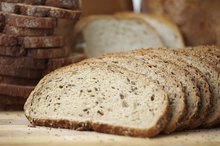What does fact checked mean?
At Healthfully, we strive to deliver objective content that is accurate and up-to-date. Our team periodically reviews articles in order to ensure content quality. The sources cited below consist of evidence from peer-reviewed journals, prominent medical organizations, academic associations, and government data.
- Centers for Disease Control and Prevention: Heart Disease
- American Heart Association: Monounsaturated Fats
- American Heart Association: Polyunsaturated Fats
The information contained on this site is for informational purposes only, and should not be used as a substitute for the advice of a professional health care provider. Please check with the appropriate physician regarding health questions and concerns. Although we strive to deliver accurate and up-to-date information, no guarantee to that effect is made.
A Diet Plan for Coronary Heart Disease
Coronary artery disease represents the most common form of heart disease in the United States. It occurs when waxy plaque builds up inside the walls of your coronary arteries, which supply blood to your heart. Having CAD puts you at risk of having a heart attack, making intervention necessary. Implementing a program called the Therapeutic Lifestyle Changes diet remains the mainstay in treating this disease. Start the TLC diet right away, since you already have heart disease, recommends the National Heart, Lung and Blood Institute.
Purpose of the TLC Diet
One of the main purposes of the TLC diet is to reduce the amount of saturated fats in your diet, since such fats raise cholesterol. Many individuals with CAD have too much cholesterol in their blood. The TLC diet is low in fat and low in cholesterol, which decreases your chance of having a heart attack or other heart disease complications. Your doctor may refer you to a registered dietitian to teach you how to implement the TLC diet guidelines.
- One of the main purposes of the TLC diet is to reduce the amount of saturated fats in your diet, since such fats raise cholesterol.
- The TLC diet is low in fat and low in cholesterol, which decreases your chance of having a heart attack or other heart disease complications.
Saturated Fat, Cholesterol and Salt Guidelines
Yogurt & Granola Diet
Learn More
On the TLC diet, you aim to limit your total fat intake to 25 percent to 35 percent of your daily calories. When it comes to daily fat intake, the goal is to get less than 7 percent of your daily calories from saturated fat and to limit cholesterol to less than 200 milligrams daily. In addition, you aim to limit your sodium intake to no more than 2,400 milligrams each day. You may need to lower your sodium intake further if you suffer from high blood pressure.
- On the TLC diet, you aim to limit your total fat intake to 25 percent to 35 percent of your daily calories.
Fiber and Unsaturated Fat Guidelines
When you do consume fat, aim to get the bulk of your fat calories from unsaturated sources. The TLC diet recommends getting up to 10 percent of your calories from polyunsaturated fats and up to 20 percent from monounsaturated sources. Fatty fish and plant oils such as sunflower are high in polyunsaturated fats. Plant oils contain monounsaturated fat as well; these include olive oil, canola oil, peanut oil, sunflower oil and sesame oil. The TLC Diet recommends getting 20 to 30 grams of fiber per day. Fiber promotes healthy cholesterol levels. High-fiber foods include fruits and vegetables, beans, nuts, seeds and whole grains.
- When you do consume fat, aim to get the bulk of your fat calories from unsaturated sources.
- The TLC diet recommends getting up to 10 percent of your calories from polyunsaturated fats and up to 20 percent from monounsaturated sources.
Sample Meal Plan
Insulin Resistance Diet Plan
Learn More
A sample breakfast on the TLC diet may include 1/2 cup of steel cut oatmeal with 1 cup of fat-free milk and one sliced banana 2. For lunch, you might have a turkey breast sandwich using 2 ounces of lean turkey, 1 tablespoon of mayo, lettuce and tomato and whole-wheat bread. Have a cup of carrot sticks and a small apple on the side. For dinner, try a healthy 3-ounce serving of grilled or baked salmon with 1 cup of brown rice and 1 cup of broccoli. Have a side salad made with romaine lettuce, cucumbers, tomatoes and a tablespoon of olive oil and vinegar dressing. Examples of snacks on the TLC diet include mixed nuts, fruit and nonfat yogurt.
- A sample breakfast on the TLC diet may include 1/2 cup of steel cut oatmeal with 1 cup of fat-free milk and one sliced banana 2.
Related Articles
References
- Centers for Disease Control and Prevention: Heart Disease
- Cigna: TLC Diet Sample Menu
- American Heart Association: Monounsaturated Fats
- American Heart Association: Polyunsaturated Fats
- Third Report of the National Cholesterol Education Program (NCEP) Expert Panel on Detection, Evaluation, and Treatment of High Blood Cholesterol in Adults (PDF), July 2004, The National Institutes of Health: The National Heart, Lung, and Blood Institute.
Writer Bio
Janet Renee is a clinical dietitian with a special interest in weight management, sports dietetics, medical nutrition therapy and diet trends. She earned her Master of Science in nutrition from the University of Chicago and has contributed to health and wellness magazines, including Prevention, Self, Shape and Cooking Light.









